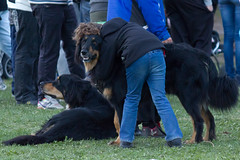Human and Dog – a Bond of True Love

All over the world, extraordinary stories of dogs are reported in the news. In Scotland, an Akita jumped into freezing water to save his owner from drowning, in Australia, a dog laid next to his owner, trapped under his vehicle, for 4 days, keeping him warm and saving his life. In Colorado, a 5 lbs Chihuahua went after a three ft rattlesnake as it was approaching a one year old child. Dogs are reported to walk over far away distances, like Bucky, a 3 year old lab, who took a 500 miles journey to get back with his owner. Page after page, the Internet unveils accounts of dogs risking their life and going beyond what’s possible, all for the love of their human. These stories are not just heartwarming tales that we discuss around the table. They are true testimonies of the intensity of the bond a dog can develop for his human. With the advances of science, we can now better understand this incredible relationship that the dogs form with us.

While many owners decide to adopt a second dog to keep their first dog company, the truth is, most dogs will prefer being with their owner rather than with other dogs. When measuring stress hormones of dogs placed in a new environment, studies have even shown that their levels of glucocorticoid (a stress hormone), was lower when a person was present rather than if they were left with other dogs. It didn’t matter that they had only occasionally interacted with the person who was mostly there to clean up their kennel and feed them as opposed to the other dogs they had lived with.
Inspired by an study originally developed to understand the relationship between a mother and her child, dogs were brought into a playroom and either left with a stranger, a stranger and their owner, or left alone. The authors of the studies found that, most dogs reacted in ways very similar to children, playing more when the owner’s in the room and displaying extreme searching behaviors, like barking and scratching at the door, when the owner was gone. The authors concluded that the relationship between dogs and humans is very similar to that of children to their parents.

Many young mammals suffer what looks like a panic attack when separated from their caregivers (Panskepp, 2012), just like our dogs do (separation anxiety). A caregiver is what we are for our dogs. When we think of it, why wouldn’t the dog see us as our children do in a similar way? After all, we’re the providers of all their basic and fundamental needs. They’ll enjoy playing and interacting with other dogs, but they’ll completely depend on us when it comes to food, shelter and care. Even our petting is comparable with the licking a mother dog will give her pups. It’s no wonder that, just like infants and their moms, dogs and owners both experience an increase in oxytocin levels after close interaction. Oxytocin is a hormone said to be responsible for inducing feelings of trust and love, milk secretion in lactating mothers, creating and maintaining bonds between parents and their infants but also between two adults in a relationship. Many mammals also have very strong caring instincts, looking after their young sometimes at the expense of their own comfort and survival (Panksepp, 2012) and as shown in the stories above, dogs do care about us too.
Let’s make it clear, we should be careful not to anthropomorphize our dogs. They are a different species with many differences with humans that we should understand and respect in order to best provide for their needs. As mammals, however, we share many of the same fundamental brain functions. As dog owners, what we have intuitively known all along, we can now support with scientific evidence. We develop true, emotional and chemical bonds with our beloved dog and those feelings are mutual. Our dogs love us like a child loves a parent and has the ability to care about us, grieve our loss and possibly even empathize with us (Panskepp, 2012). Dogs truly deserve the title of Man’s Best Friend.
Jennifer Cattet, Ph.D.


Leave a comment